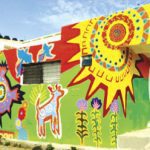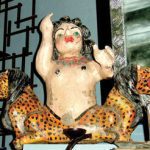Focus on Art
By Rob Mohr
“Alice was through the glass, and had jumped lightly down into the looking glass room.” Lewis Carroll—Through the Looking Glass
The rich metaphorical stories by Lewis Carroll give the reader new understandings concerning the worlds created by artists through artifacts and performances. Art makes hidden worlds manifest through emotions, sensations, and understandings of the materials, sounds, and words used in the process of creation. Yet how often do we, without reflection, prejudge literature, poetry, visual arts, classical music, and opera, and say, “I don’t get it – Too modern for me – I’ve never liked poetry – This is beyond me.”
John Dewey taught reflection is essential if we are to avoid the loss caused by such snap judgments. The curious mind explores, seeks nutritive input, welcomes challenge, and seeks the stillness of reflection. Creativity encourages random thoughts to wander through the landscape of the mind.
How might your life change if in place of rejecting works of art, you opened yourself and engaged them in a two way conversation? Enter through that doorway into unexplored worlds that offer challenges, a different culture, with different norms, customs, and language that broaden your understanding of the possible. Your inability to initially speak the alternative language will ultimately increase your excitement and the thrill of exploration as you learn.
Harold Bloom (1930 -) called this transition, “the ecstasy of the privileged moment,” a moment when one steps into a painted world like Pieter Bruegel’s (1525-1569) Wedding Dance, to become a participant in a dance that took place in the Netherlands of 1551. (Photo 1)
Pass through the same looking glass into the synergy of the cave drawings in Chauvet (30,000 BC), or the domains of Pablo Picasso (1881-1973), and experience how both reveal worlds previously unimagined. Or journey with John Cage (1912-1992), who made music from random sounds, or Jackson Pollock (1912-1956), who used paint as his subject. Pass through sensual, often spiritual, windows opened by Henri Matisse (1894-1910)(Photo 2) and Mark Rothko (1903-1970). Or consider the abstract works of Gerhard Richter (1932-), who understands art as an unexpected transcendent journey where viewers may connect with universal consciousness.
These artists and works reveal the wonder of places and realities never seen before – places and experiences of infinite, sensory, cognitive and spiritual dimensions that engender a sense of wonder.
Art, whether figurative or abstract, brings unknown universes into being, and communicates with us in a new language that meets our hunger for transcendence. Mark Rothko’s vibrant abstract panels, heavy with paint and rich in color, become portals to an ethereal space. He believed, “… only abstract art can bring us to the threshold of the divine.” The Rothko Chapel in Houston has become a destination for spiritual pilgrimages where participants, fixed in silence, surrounded by his works, experience spiritual stillness akin to Buddhist centering.
Poetry also challenges us to transcend the limits of reality. Cross the threshold into poetry’s realm and be transformed by the rich language and erotic imagery of Pablo Neruda, or eavesdrop on Cynthia Cruz’s introverted, and tortured, province of fear.
Pablo Neruda
I do not love you as if you were a salt rose, or topaz or the arrow of carnations the fire shoots off.
I love you as certain dark things are to be loved,
in secret, between the shadow and the soul.
Cynthia Cruz
I am. The sorrow … The night,
With its kingdom of lanterns and awful blue lark.
How we waited, how we hid
Like wolves, in the revolving questions of a field.
Pass through the metaphorical veil of Lewis Carroll’s stories to affirm how encounters with the visual arts, music, performance arts, literature, and poetry, transcend and define human evolution and expand our search for the meaning of life.
Nourish yourself – experience the rapture engendered by the arts.
https://plus.google.com/photos/111258927866130698336/albums/6347713394110798161
- April 2024 – Issue - March 31, 2024
- April 2024 – Articles - March 31, 2024
- April 2024 - March 31, 2024








